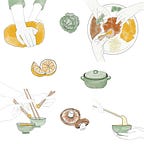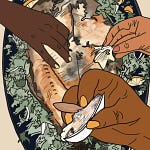Paris, 1942. A group of women storm a grocery store on the Rue de Buci to seize the sardines on sale that day and distribute them to a hungry crowd. A scuffle ensues, shots ring out — and at the end, two policemen are dead. Today, the Rue de Buci event is remembered as an act of women’s resistance during wartime. But is that all there is to it?
In this episode of Feminist Food Stories, founding editor Isabela sits down with Paula Schwarz, the Lois B. Watson Professor Emerita of French & Francophone Studies at Middlebury College and author of Today Sardines Are Not For Sale: A Street Protest in Occupied Paris, to discuss the intersections of wartime food politics and gender, and why and how resistance is remembered in different ways.
This podcast features writing and research by Isabela Vera; sound editing by Isabela Bonnevera & Zoë Johnson, and original music by the Electric Muffin Research Kitchen. You can also listen to it on Apple Podcasts and Google Podcasts.
SHOWNOTES
Transcript
Read the show transcript here.
Further reading
Boyle, E. (n.d.). Wartime Memories: Louise Mardon. <https://www.eleanorboyle.com/wartime-memories/louise-mardon>
Brown, T. (2022). The Breadwinners: The Women Whose Hunger Drove the French Revolution. Feminist Food Journal.
Hunt, K. (2010). The Politics of Food and Women's Neighborhood Activism in First World War Britain. International Labor and Working-Class History, 77(1), 8-26. doi:10.1017/S0147547909990226
Schwartz, P. (1999). The politics of food and gender in occupied Paris. Modern & Contemporary France, 7:1, 35-45, DOI: 10.1080/09639489908456468.
Schwartz, P. (2020). Today Sardines Are Not For Sale: A Street Protest in Occupied Paris. Oxford University Press. (If you’re interested in reading it, you can order it using the discount code here!)












